The First World War was an unprecedented catastrophe that killed millions and set the continent of Europe on the path to further calamity two decades later. But it didn’t come out of nowhere. With the centennial of the outbreak of hostilities coming up in 2014, Erik Sass will be looking back at the lead-up to the war, when seemingly minor moments of friction accumulated until the situation was ready to explode. He'll be covering those events 100 years after they occurred. This is the 68th installment in the series.
May 14, 1913: Serbia and Greece Ally Against Bulgaria
By May 1913, the Balkan League had disintegrated, as the former allies turned on each other over the spoils of the First Balkan War. Deprived of its Albanian conquests by the Great Powers, Serbia asked to revise its 1912 treaty with Bulgaria to get a bigger share of Macedonia, but was rebuffed (or rather, ignored). To the south, Greece refused to give up Salonika, also claimed by the Bulgarians, while to the north Romania wanted a chunk of Bulgarian territory in Dobruja in return for agreeing to Bulgarian expansion elsewhere. Looking around, Bulgaria’s impetuous Tsar Ferdinand (above) suddenly found himself long on enemies and short on friends.
On May 14, 1913, Greece and Serbia cemented their secret treaty of May 5 with a military convention directed against Bulgaria, dividing Macedonian territory claimed by Bulgaria and outlining a plan of attack to secure their goals. In the disputed area, the Greeks and Serbians agreed to a border west of the Vardar River, although the details remained fuzzy; meanwhile, both partners were already moving their troops to concentration areas near Bulgarian-occupied territory, and the Serbs were organizing paramilitary groups to create chaos behind enemy lines.
Crucially, while the new alliance was directed against Bulgaria, it also divided up the new nation of Albania into Greek and Serbian spheres of influence—indicating that whatever promises they made to the Great Powers at the Conference of London, the Serbs had no intention of actually giving up their claim to Albanian territory. Of course, this put them on a collision course with Austria-Hungary, whose foreign minister, Count Berchtold, had been the driving force behind the creation of Albania precisely to prevent Serbia from gaining access to the sea.
The Serbs and Greeks now turned to delaying tactics: By dragging out peace negotiations at the Conference of London, they gave their armies more time to concentrate near the Bulgarian border while keeping Bulgarian troops tied up in the east, where the Bulgarians still faced Turkish armies at Chataldzha and the Gallipoli peninsula. For their part, the Bulgarians were eager to make peace with Turkey so they could redeploy their troops west against Serbia and Greece. The conflicting national aspirations of the Balkan states were bubbling up, and the Second Balkan War was a month and a half away.
The Romanian Conundrum
The Romanian situation was another headache for Tsar Ferdinand, who refused to give up Bulgarian territory in Dobruja even after the Great Powers awarded it to Romania at a side conference in St. Petersburg on May 8, 1913. Romania was benefiting from rivalry between the two European alliance blocs, as both the Triple Alliance (Germany, Austria-Hungary, and Italy) and the Triple Entente (France, Russia, and Britain) vied for Romania’s favor by taking her side in territorial disputes—a classic example of the “tail wagging the dog,” as a smaller state exploits tensions between larger states to force them to do its bidding.
Although nominally aligned with the Triple Alliance, Romania was drifting towards neutrality—or even an outright switch to the Triple Entente. The matter was complicated for the Triple Alliance by Austria-Hungary’s large Romanian population, which resented the oppressive policies adopted by the Hungarian half of the Dual Monarchy against its own ethnic minorities. The Hungarians feared (not without reason) that Romanians in the Kingdom of Hungary wanted to be reunited with their ethnic kinsmen in the neighboring Kingdom of Romania, much as the Empire’s Slavs hoped for union with Serbia.
Of course the political disenfranchisement of Romanians in Hungary also angered Romanian nationalists in Romania itself—presenting yet another dilemma for Count Berchtold, who somehow had to square all these interests when crafting the Dual Monarchy’s foreign policy. If the vacillating foreign minister made too many concessions to the Romanians, he would anger the Hungarian elite and lose his domestic support; if he let the Hungarians bully their own Romanian subjects too much, Romania might leave the Triple Alliance and join the Triple Entente.
On top of all this, there was political intrigue to deal with as well: The heir to the throne, Archduke Franz Ferdinand, and chief of staff Conrad von Hötzendorf both hated the Hungarians and favored concessions to the Romanians at home and abroad, but were opposed by the powerful Hungarian statesman István Tisza, who seemed to be the only politician able to keep Hungary in line with Austria. On June 4, 1913, Emperor Franz Josef was forced to ask Tisza to form a new Hungarian government, further limiting Berchtold’s freedom of movement on the Romanian issue.
See the previous installment or all entries.
